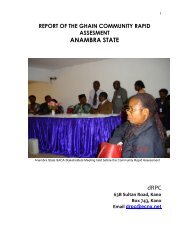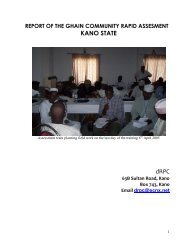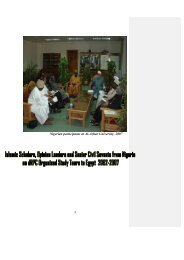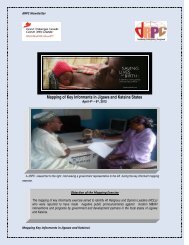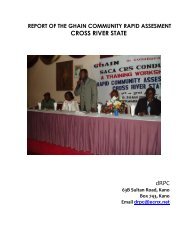Gate - the The development Research and Projects Centre (dRPC)
Gate - the The development Research and Projects Centre (dRPC)
Gate - the The development Research and Projects Centre (dRPC)
Create successful ePaper yourself
Turn your PDF publications into a flip-book with our unique Google optimized e-Paper software.
post-test counseling. At one time <strong>the</strong>y gave pregnant women who were positive vitamins <strong>and</strong>, at <strong>the</strong><br />
time of birth, neviripine tablets. <strong>The</strong>y also gave neviripine “syrup” to infants immediately after<br />
birth. Pathfinder provided <strong>the</strong> drugs. But now <strong>the</strong>se mo<strong>the</strong>rs are referred to General hospital to<br />
deliver <strong>the</strong>ir babies.<br />
In addition to basic medical services, <strong>the</strong> military also provides office space for <strong>the</strong> AIDS club. For<br />
additional support, <strong>the</strong> group seeks help from a number of private <strong>and</strong> non-governmental sources.<br />
For example, <strong>the</strong> week before this visit, club members collected food <strong>and</strong> o<strong>the</strong>r supplements from<br />
FACA. Occasionally, local churches donate money, food <strong>and</strong> gifts. For example, Redeem Christian<br />
Church of God recently donated a bag of rice as did NEPHWAN, <strong>and</strong> <strong>the</strong> House of <strong>the</strong> Rock, a<br />
Pentecostal Church in Abjua, gave 50,000 naira to assist PLWHAs. O<strong>the</strong>r contributions include<br />
services. Through Audu, 12 local NEPHWAN groups offer HIV counseling to PLWHAs, <strong>the</strong> Center<br />
for Rights to Health provides home-based care, <strong>and</strong> Pathfinder gave 200 testing kits for pregnancy<br />
<strong>and</strong> HIV to <strong>the</strong> barracks hospital.<br />
Stigma <strong>and</strong> <strong>the</strong> Military<br />
<strong>The</strong> Military has a non-discrimination policy with regard to HIV positive service men <strong>and</strong> women;<br />
however policy may not always translate into practice. According to key informant Audu, <strong>the</strong> non-<br />
discriminition policy is frequently violated. As a counselor to many service people with HIV, Audu<br />
said that he has heard stories of blatant discrimination directed towards PLWAs, so much so that<br />
most HIV positive soldiers refuse to “come out” for fear of <strong>the</strong> negative consequences. For example<br />
, Captain Ojie said that HIV positive soldiers are assigned light duty like patrolling. “<strong>The</strong>y are given<br />
regular jobs. This is <strong>the</strong> law,” she said. However, to reap this benefit, a soldier must tell <strong>the</strong><br />
comm<strong>and</strong>ing officer his serostatus, thus risking exposure. According to Audu, soldiers are afraid to<br />
come out because “<strong>the</strong>y will be pushed aside.” He <strong>the</strong>n recounted an incident in which a<br />
comm<strong>and</strong>ing officer told an HIV positive serviceman in his unit to “just go” because <strong>the</strong> rest of <strong>the</strong><br />
unit did not want him around.<br />
In addition, <strong>The</strong>y cannot travel, <strong>the</strong>y are disqualified from getting a travel allowance, which is small<br />
but critical to <strong>the</strong> families‟ income. Audu, himself, has suffered from blatant discrimination by<br />
members of his unit after revealing his serostatus:<br />
42



